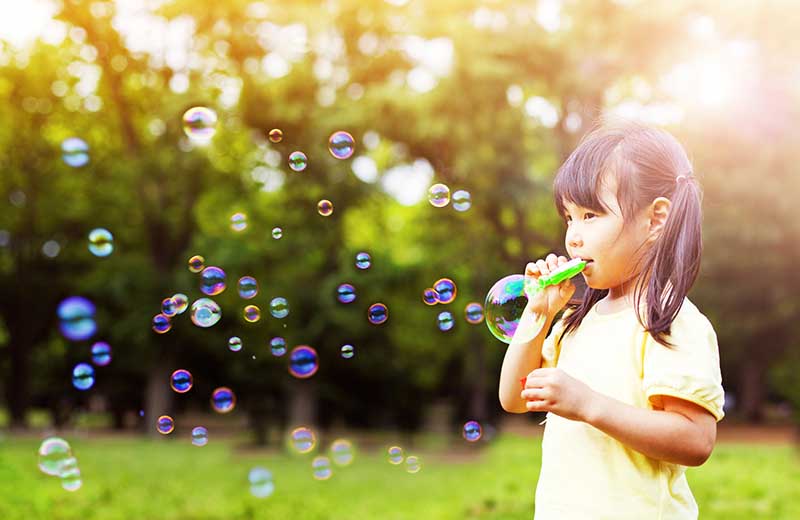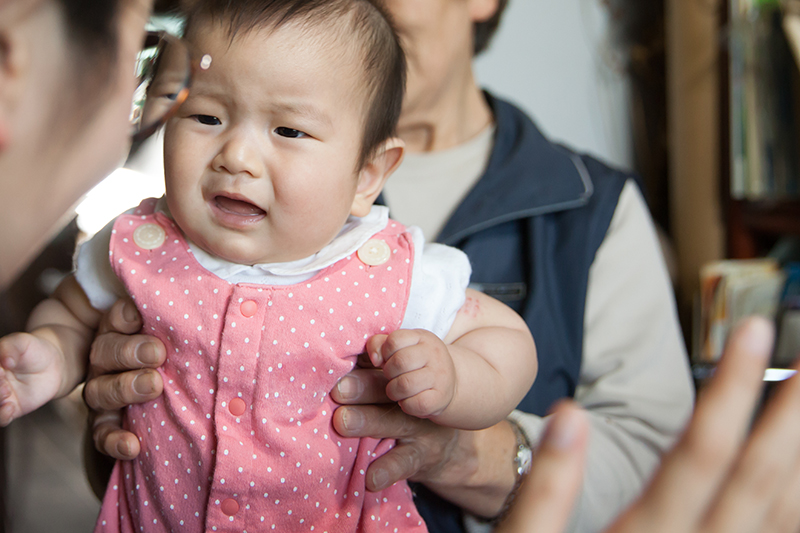Families For Life | Fear of Strangers: Babies and Young Children-Babies

DID YOU KNOW?
Play is a great relationship builder. Spending time playing with your child sends a simple message – you are important to me. Help your child learn about who she is and where she fits in the world.
READ MORE

Fear of strangers is a normal part of young children’s development. Although fear of strangers usually passes by around 18 months of age, it can go on for longer. Our practical strategies can help your child feel less upset while he goes through this phase.
About fear of strangers
Fear of strangers is very common.
It happens as your baby develops a healthy
attachment to familiar people – like you. Because babies prefer familiar adults, they might react to strangers by crying or fussing, going very quiet, looking fearful or hiding.
Fear of strangers starts at 5-6 months and usually becomes more intense at 7-10 months of age. It can last a few months or continue for much longer. It often decreases somewhere between 18 months and 2 years, but it can last longer depending on a child’s temperament.
For example, a 10-month-old baby who has been going to child care since they were 6 months old might get upset if there’s a new carer at the centre. They might cry, bury their head in their parent’s neck or scream when the carer tries to take them from their parent.
Helping your child feel comfortable around strangers
Although fear of strangers is part of how babies and young children develop, there are things you can do to help your child feel less upset.
Helping your child feel comfortable around strangers
Don’t ignore or dismiss your child’s fear of strangers. This could make the fear worse.
Hold your child’s hand or let them sit on your lap when they meet new people.
Introduce strangers first at home, if possible. Home is where your child feels most comfortable.
If your child gets very upset with a new person, comfort them and try a different approach like all playing together. You could also move your child slightly away from the new person until they calm down. Then you can try again.
Take your child’s comfort item (toy or blanket) with you when you’re spending time with new people.
Stay calm yourself. Your child will pick up on your cues. They’ll be more likely to be calm and confident if they sense that you feel the same way.
Taking it slowly
Be patient. Don’t push your child to go to new people before they’re ready.
Try to introduce new people one at a time, rather than in groups. You can work up to introducing 2 or more people as your child develops confidence.
When you introduce your child to someone new, stay with your child. This will reassure them that you’re not going to leave them with unfamiliar people straight away.
Ask unfamiliar adults, like extended family or adult friends, to wait for a while before they pick up your child.
For slightly older children, explain to your child who the new person is and what’s happening. For example, explain that the new babysitter is someone you trust. Also say when you’ll be back.
Meeting new people
Keep introducing your child to new people. The more chances your child has to meet new people and discover that they’re safe, the more likely it is that their fear will reduce.
Show your child that you’re not scared of new people. Greet them warmly with positive body language – smiles, relaxed posture, eye contact and a happy voice.
Help older children practise some coping strategies for meeting new people – for example, ‘Let’s take some calm breaths together’ or ‘Here’s a big kiss that will last all day. Can I have one too?’ These simple strategies can help your child feel more confident around unfamiliar people.
Don’t worry about grown-ups’ feelings. Just tell them that your child is learning to be around strangers.
Fear of strangers in children over 2 years
Most children’s fear of strangers starts to pass by about 2 years, but it isn’t unusual for older children to be afraid of strangers also.
One way to help with worries about unfamiliar people is to build your child’s independence. If your child feels more independent, they might also feel more confident around strangers.
Here are some tips to help with independence:
Let your child do things for themselves, like feeding themselves, exploring new play environments and entertaining themselves with toys.
Give your child plenty of new experiences and introduce them to new faces. With time, they’ll realise that nothing bad will happen.
Try not to rush in to solve problems, and give your child a chance to work out solutions for themselves.
Encourage your child to be responsible for simple family chores - for example, putting things in the supermarket trolley, checking the letterbox or setting the table.
Help your child learn to settle for sleep away from home. This will help if you need to leave your child over a naptime or bedtime - for example, at child care or for a sleepover at a relative's house.
Getting help for fear of strangers
Extreme fear of strangers might lead to social anxiety when your child is older. So it’s worth talking to a health professional if your young child’s fear of strangers is really intense or if it doesn’t reduce even when there are no unfamiliar adults around.
Also, if your child’s fear of strangers isn’t getting any better by the time they’re 2 years old or it’s getting worse, you might want to think about seeking professional help.
And it might also be a good idea to seek help if there’s a family history of anxiety, because your child might be showing early signs of anxiety.
You know your child best. If you’re worried about his fear of strangers, you could talk to the following professionals:
your child’s General Practitioner (GP) or paediatrician
your child’s school counsellor
© raisingchildren.net.au, translated and adapted with permission
Explore more